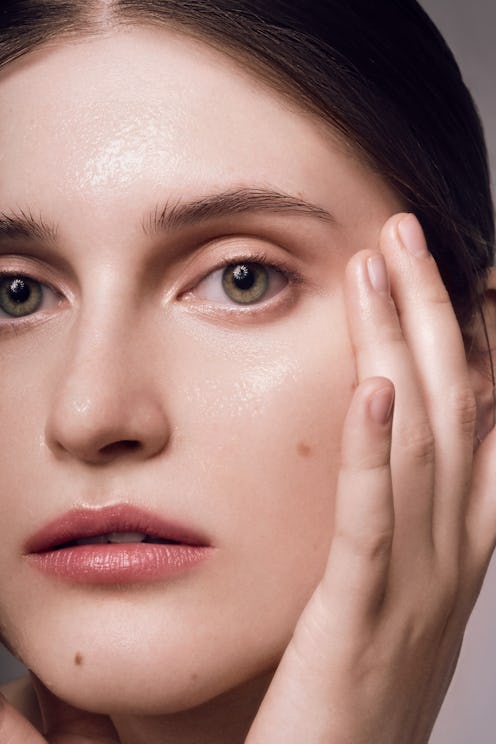(Skin)
Is An ‘Anti-Glycation’ Skin Care Routine The Secret To Slowing Aging?
Experts break down the latest buzzword.

The term “glycation” sounds like it’s straight from a biology textbook — and if you went looking, there’s a good chance you’d find it in the glossary of one. The buzz word describes a physiological process involving sugar molecules in the body that accelerates skin aging and the development of visible changes like fine lines and wrinkles. It’s not a new biological phenomenon by any means, but as you may have noticed, it’s a term that’s seemingly popping up more frequently in the skin care industry, with some brands even using the phrase “anti-glycation” to describe their formulas.
But can applying a cream, a serum, or any skin care product really prevent glycation from contributing to skin aging? Of course, you may also be wondering if the existing products in your lineup are up for the job. Ahead, dermatologists demystify the trending topic, including what causes glycation, what you can do to slow down the process, what makes a product “anti-glycation,” and more.
What Is Glycation?
According to Dr. Corey L. Hartman, MD, founder of Skin Wellness in Birmingham, Alabama, glycation is a process where sugar molecules bind to lipids and proteins in the body and advanced glycation end products (also known as AGEs) are created, which damage proteins (like collagen and elastin) and lipids in the skin.
How Does Glycation Affect Skin Aging?
It all goes back to how AGEs damage the proteins that give your skin structure and elasticity, keeping it looking firm, plump and smooth. “Glycation weakens the collagen and elastin in the skin, which are responsible for skin’s integrity,” says Dr. Hartman. “As skin integrity breaks down, you will likely see signs of skin aging, like drooping skin, sagging skin, fine lines, and wrinkles, and dull skin.” What’s more, Dr. Hartman says glycation can also contribute to free radical creation, which in turn can cause inflammation and further speed up the skin aging process.
While many of us may be new to the skin-aging effects of glycation, it isn’t a new biological discovery. Dr. Melissa Kanchanapoomi Levin, MD, a board-certified dermatologist and founder of Entière Dermatology, says glycation was first described over 100 years ago by French chemist Louis-Camille Maillard.
So why is the term glycation getting more attention these days? Dr. Levin thinks it may have something to do with more knowledge of and studies examining the aging process. “Generally, we have a much better understanding of aging, but also specifically aging of the skin as well, so I think this is where it comes from.” And while the term “anti-glycation” may be fresher in terms of skin care marketing, Levin also mentions products that address the side effects of glycation aren’t necessarily new either.
What Causes Glycation?
So what kickstarts glycation? Well, for starters — age. It’s a process that happens naturally as we get older, and Dr. Hartman says research has shown it can occur as early as our 20s. In addition to the natural aging process, Dr. Levin says external factors, like exposure to UV rays and pollution, can influence its occurrence — basically all the things we already know we’re supposed to avoid to maintain the health of our skin and minimize wrinkles from popping up prematurely.
Perhaps unsurprisingly given that this process involves sugar molecules in the body, a high-sugar diet may also play a role in speeding up glycation and its side effects. “There is a connection between a higher-sugar diet and signs of glycation — newer research shows that if you eat a diet higher in sugars, it can accelerate the glycation process, in addition to other challenges, like increasing risk for metabolic diseases,” says Dr. Hartman.
Can You Prevent Glycation?
There’s nothing you can do to fully halt glycation, but you can help slow it down. Certain lifestyle choices, like maintaining an antioxidant-rich, low-sugar diet to slow glycation, and practicing regular cardiovascular exercise to minimize oxidative damage and control sugar levels, can also play a part in preventing it, explains Dr. Levin.
“Doing things to keep your body regulated, like getting the proper amount of sleep and trying to reduce stress can also help slow down the effects of glycation,” adds Dr. Hartman.
Of course, your skin care routine can also play an important part in decelerating glycation. “For the skin, ingredients such as antioxidants like niacinamide, licorice root, and vitamin C can neutralize the formation of AGEs,” says Dr. Levin. “Other ingredients such as peptides and retinol can be helpful.”
While it isn’t necessary to go out and buy formulas that are specifically labeled as having anti-glycation benefits, they may make the shopping experience more straightforward. For example, the SkinCeuticals A.G.E. Advanced Eye Cream, a formula designed to reduce the appearance of crow’s feet, is infused with a 4.25% wild fruit flavonoid blend to defend against both glycation and UV-induced glycation.
In addition to glycation-fighting niacinamide, Element Eight’s O2 Eight Active Niacinamide Serum, a hydrating, multitasking serum that offers a myriad of benefits like improving skin barrier function, reducing fine lines and wrinkles, and brightening the skin, is formulated with an ingredient called carnosine, which the brand says contains antioxidant properties and promotes anti-glycation. Yonka Paris Excellence Code Contours, an eye and lip cream, is said to provide an “anti-glycation effect” and firm the skin. There’s also ISDIN’s Isdinceutics Age Contour, a firming and smoothing face and neck cream powered by carnosine to fight glycation.
And if you aren’t interested in spending more money, you can rest assured that applying SPF, your daily vitamin C serum, and your retinol cream is helping the cause.